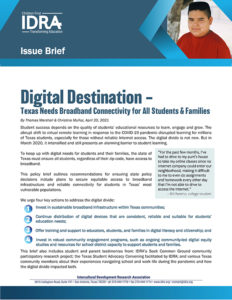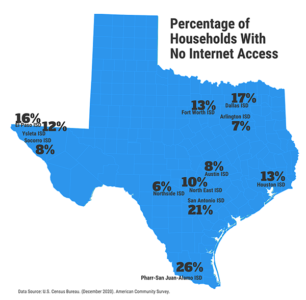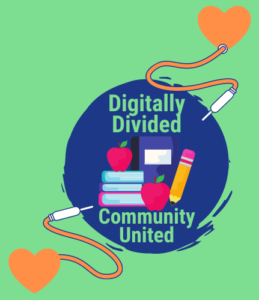IDRA Releases New Report, Launches Video Campaign Addressing Digital Divide
IDRA News Release • San Antonio • April 21, 2021


“Without strong Internet access, students can’t connect to get assignments, see their teachers’ instruction or interact in class discussions,” said Celina Moreno, J.D., IDRA President & CEO. “Despite common perception, the digital divide impacts not only rural communities but also many students in urban centers who carry the brunt of limited broadband access.”
1.7 million Texas households (18%) did not have reliable broadband access, and over 637,000 did not have a computer as the pandemic began. Latino students and Black students are less likely than their white peers to have access to the Internet.


- Invest in sustainable broadband infrastructure within Texas communities;
- Continue distribution of digital devices that are consistent, reliable and suitable for students’ education needs;
- Offer training and support to educators, students and families in digital literacy and citizenship; and
- Invest in robust community engagement programs, such as ongoing community-led digital equity studies and resources for school district capacity to support students and families.


Authored by Thomas Marshall and Christina Muñoz, two IDRA Education Policy Fellows, the report itself includes testimonies from students and community members participating in multiple IDRA stakeholder convenings with educators, superintendents, students and families about the challenge Internet access is a for school districts.
One student, Bill Ramiro, said, “For the past few months, I’ve had to drive to my aunt’s house to take my online classes, making it difficult for me to even do assignments and homework every day I’m not able to drive there.”
Another student, Andrea Guzmán, described: “With slow Internet, we become anxious and stressed because the pages won’t load fast enough. We have the constant thought that the Internet might crash at any moment and we won’t be able to access the exam anymore.”
Media contact: Christie L. Goodman, APR, IDRA Director of Communications, christie.goodman@idra.org, 210-444-1710
Intercultural Development Research Association is an independent, non-profit organization, led by Celina Moreno, J.D. Our mission is to achieve equal educational opportunity for every child through strong public schools that prepare all students to access and succeed in college. IDRA strengthens and transforms public education by providing dynamic training; useful research, evaluation, and frameworks for action; timely policy analyses; and innovative materials and programs.


